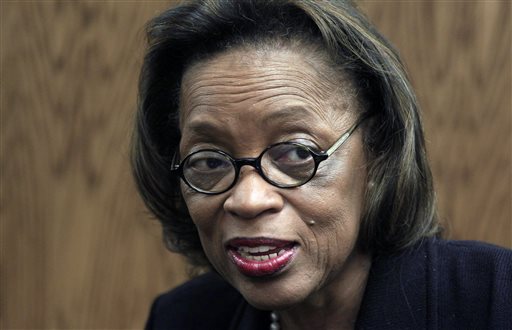NASHVILLE - Tennessee Rep. Lois DeBerry, one of the longest serving female lawmakers in the nation and a powerful influence in state politics, died Sunday after a nearly five-year bout with pancreatic cancer. She was 68.
The Memphis Democrat was surrounded by family and friends when she died at a Memphis hospital, her nephew, Gary DeBerry, told The Associated Press.
First elected in 1972, DeBerry was the longest-serving member of the state House of Representatives and second-longest in the entire Tennessee General Assembly. Nationwide, according to the National Conference of State Legislatures, only two other female lawmakers elected in 1972 are still serving.
She also was the second African-American woman to serve in the Tennessee General Assembly.
As the first female speaker pro tempore in the House, she was respected by her colleagues, who gave her the honorary title of speaker emeritus. Legislative leaders on both sides of the aisle sought her support on key legislation.
A close friend of former Vice President Al Gore for more than 30 years, she gave a rousing presidential nominating speech for Gore at the Democratic National Convention in 2000.
"The Gore campaign at that time needed a sparkplug, someone to stand up and give a ... call to action," recalled Rep. John DeBerry, a distant relative who served with her more than 20 years in the Legislature. "And Lois was chosen for that. She brought him on to a rousing applause."
DeBerry pushed legislation to benefit poor people, children, senior citizens and college students. One proposal was aimed at keeping students out of debt by restricting credit card companies from soliciting on college and university campuses.
Memphis Mayor A C Wharton Jr. said Sunday that DeBerry's faith and outspokenness earned her the adoration of many in the Memphis community.
"For those in political circles, she was Speaker DeBerry, a trusted partner and consummate advocate for the people of Memphis and our state," Wharton said in a statement. "Many of her friends and people across the community, however, also knew her as Lady D - an intelligent, cosmopolitan, personality whose passion for the people she served knew no bounds."
Gov. Bill Haslam, a Republican, called DeBerry a history maker and a true friend.
"Coming in as a new governor, Lois quickly became one of my favorite people on Capitol Hill because of her wit, charm and dedication to her constituents," Haslam said in a statement.
DeBerry discovered she was in the early stages of cancer in 2009. After being diagnosed, she underwent several weeks of chemotherapy before having surgery. After more chemo treatments, the cancer seemed to have gone into remission. But then she had a setback.
At that point, DeBerry told the AP, she felt like giving up. Instead, she said she relied on her faith and the overwhelming support of family, friends and political colleagues who showered her with encouragement.
DeBerry missed only a few days of the legislative sessions, and would often drive more than three hours to Memphis after having treatments on a Thursday and return to Nashville on time the following Monday for session.
And though she may have been weary, she still managed to make her presence known in the House chamber. One of her pet peeves was male lawmakers not wearing their jackets while speaking on the House floor, and she didn't hesitate to do something about it, as Rep. G.A. Hardaway can attest.
One day while he was debating a colleague about a bill, DeBerry walked up behind him, took his jacket off the back of his chair and placed it around his shoulders. The chamber erupted in laughter.
"Nobody gave me any kind of warning, so the next thing I know I'm feeling something on my back," said Hardaway, D-Memphis. "I turn around and it's Lois. Then I understood what the issue was."
DeBerry continued to fight the disease for nearly two more years. Even when her doctors told her there was no more they could do, she still attended legislative meetings and worked to address the needs of her constituents.
House Minority Leader Craig Fitzhugh said her resilience in her final days was "unbelievable."
"We'd say, why is she doing this? It's got to be painful, it's got to be very stressful on her," the Ripley Democrat said. "She was one of a kind, there's no question."
Rep. Karen Camper, D-Memphis, said women like DeBerry and the late Dr. Dorothy L. Brown, the first black woman to serve in the General Assembly, inspired other African-American women to run for office.
"Lois DeBerry ... made us feel like it was possible to be in politics and that you can be a strong voice in a male-dominated world," said Camper, who is black.
Last year, Haslam declared November pancreatic cancer awareness month in Tennessee, mainly because of DeBerry, who was supporting legislation in Congress that sought to put more money toward fighting the disease.
House Clerk Kim Cox, a close friend who helped care for DeBerry in her final days, said she strove to make a difference in the lives of people she encountered.
"If she gave a speech, she wanted to leave people with the thought of making a difference, because that's what she's been about," Cox said.

